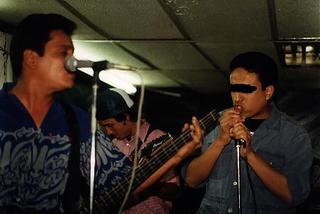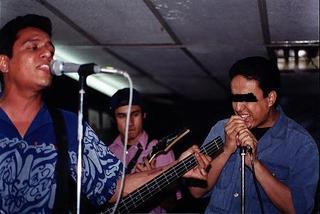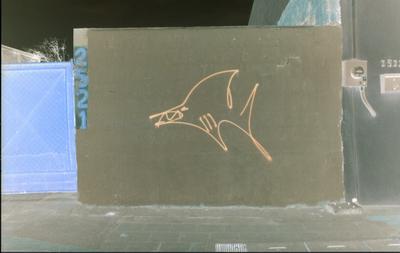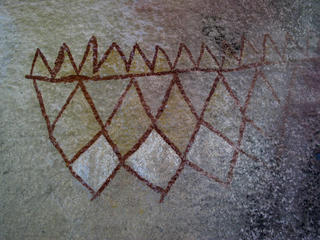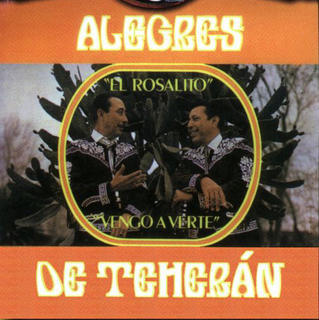
"Ry Cooder siempre ha sido un devoto de la música Tex Mex, lo que lo llevó a buscar el sonido distintivo del acordeón de ``El Flaco'' Jiménez, con quien todavía suele reunirse de vez en cuando. ``Nos divertimos mucho durante años. Todavía lo veo, creo que tocamos bien cuando estamos juntos. En los setenta teníamos esta gran banda de San Antonio. Fuimos a Europa, a todas partes. ¡Por Dios, toqué con Los Alegres de Teherán. Si los has visto, has visto lo mejor del mundo. Son los dioses de la música texana. Eso fue a principios de los setenta. Estaba en Reynosa, Tamaulipas, y fui a verlos porque había comprado sus discos, y terminamos tocando juntos.''
Desde esos años, Cooder se dio cuenta de que su trabajo estaba más conectado con la música como una forma de vida que como engranaje de una industria. ``Estuve cerca de muchos bluesistas: Mississippi John Hurt, Reverd Blind Gary Davis, John Estes, ¡Dios mío! La lección es que la vida que llevan es una especie de conocimiento, una forma diferente de ver las cosas. No puedes decir que es la clase de conocimiento que lees en los libros, ni siquiera es producto de la experiencia. Es algo que va más allá.''
Tomado de: Xavier Quirarte, "UNA VASTA GEOGRAFIA SONORA" (entrevista a Ry Cooder), en: http://www.jornada.unam.mx/1998/01/04/sem-xavier.html
Reseña. Los padres fundadores.
"Los Alegres De Teran (Eugenio Abrego & Tomas Ortiz) became the first super stars of the Mexican regional music today known universally as Musica Nortena. They are the founding fathers of this delightful, lilting, regional, accordion driven music combining the popular rural dueto vocal tradition with Eugenio's button accordion and Tomas Ortiz's heavy 12 string guitar, called a bajo sexto. After making their first radio broadcasts over XET in Monterrey, N.L. around 1947, their fame slowly spread along the border. However they did not reach audiences throughout the wider Spanish speaking Western Hemisphere until well after they began to record for the Falcon label in McAllen, TX. On this CD we bring you those early, historic Falcon recordings, made before they had their first hit with "Carta Jugada." 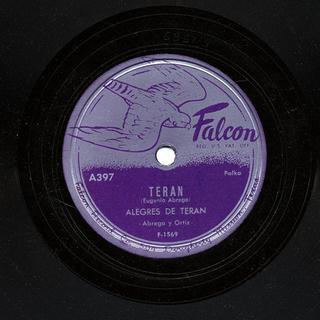
REVIEWSIN THE OLD STYLEArhoolie releases a goldmine of early tracks by LOS ALEGRES DE TERANby Will Seeley
In the world of norteño/conjunto music, much of the best music to my ears is the forgotten stars of yesteryear. Although norteño is a vital, living style of music, the younger bands lack the rhythmic flexibility and wistfulness in the harmony singing of the older, accordion/bajo sexto based music. While it's true that there are some current bands evoking the old style, most listeners consider the old style to be just that: old. The music of their parents or grandparents. Something not to be appreciated but rather to get past or only hear once in a while, not unlike Vera Lynn's World War II ballads or early Bing Crosby.
But we're lucky, because we have a record label in El Cerrito, right on San Pablo a little north of Berkeley's marina, called Arhoolie Records. Arhoolie, led by the infamous Chris Strachwitz, has been resurrecting the old style of norteño and tejano (the south Texas brand of norteño) since forever, and while he doesn't hold exclusive license to famous labels like Falcon, he manages to consistently put out amazing reissues.
And now, in 2004, we have Arhoolie's first CD reissue of the all-time superstars of traditional norteño, Los Alegres De Teran. A duo consisting of Tomas Ortiz on bajo and Eugenio Abrego on accordion, Los Alegres frequently rounded themselves out with an upright bass player, but never (to my knowledge) ventured into the land of electric bass and drums. So far, I've only come across one or two discs of music (usually later) Los Alegres that I considered suspect, but mostly they are the perfect norteño band. I like everything. Normally, if someone wanted to venture in the world of norteño, the first thing I would recommend would be a classic Falcon disc like Los Ojos de Pancha or Mas y Mas Corridos, but now I might have to change that.
Grabaciones Originales (original recordings) 1952-1954, catches Ortiz and Abrego at the dawn of their career, before their first big hit and before they became nationally known. "Carta Jugada", the song that broke them through, was recorded in 1953, and the huge success "Los Ojos de Pancha" wasn't until 1956, so this documents them after they started recording for Falcon and before they became huge stars. Due to legal issues, the hits aren't included, even though "Carta" is obviously of the right era (EMI Mexico owns most of Falcon's recordings). In fact, all of these songs never appeared on an actual LP by Los Alegres, instead only on 45s and 78s, and also never on any CD. That makes it like finding the holy grail!
Musically, one thing that distinguishes this disc from other Los Alegres discs is the proliferation of instrumentals (always a common thing in norteño, but definitely missing from their bona fide Falcon albums), and the recording quality does betray the times, although it's still quite clear. The singing is beautiful and the songs are stunning. I would qualify this as a must-have disc for any fan of norteño, or Mexican music at all, or even if you're remotely into it.
Another recent release by Arhoolie is the compilation The Roots of the Narcocorrido, a 26 track (!) compilation of corridos (narrative ballads that usually celebrate a heroic figure) spanning the years from 1888 to the 1970s, but mostly dating from the thirties and forties. (Obviously the recordings aren't from that wide a time-span, just when the songs themselves were written). The "narcocorrido" is a genre of corridos from the 1970s til the present that tell the tales of drug traffickers or other figures who move through that shadowy underworld, usually turning them into heroes. It's the norteño version of gangsta rap (sort of!)
The corridos presented here aren't really all narcocorridos, but rather an attempt by Arhoolie to demonstrate a historical precedent of idolizing Robin Hood style bandits, people who defy the authorities but who simultaneously benefit and protect the interests of their own community. There's tales of smuggling and armed resistance and more. The final track is the lone track from the actual era of the narcocorrido, and sums things up quite nicely, both stylistically and in its content.
The performers represented here go from the well-known (Los Alegres de Teran! Also check out Corridos de Contrabando on Falcon) to the less renowned, at least on this side of the border, like Gaytan y Cantu, Los Moneteños, Los Cuatesones and others. The music hews closely to the Arhoolie style of old-school norteño, with an occasional foray into pure duet singing (in many ways the genre that norteño is descended from) and even a mariachi track. Melodically, corridos can be a touch repetitive, so the content is paramount, but it's still wonderful and hugely enjoyable from a musical point of view. And if your Spanish is lacking (like me) there's full translations in the liner notes and everyone will recognize the word "marijuana" which pops up from time to time.
After all these years, if you think about it, it's pretty amazing that Strachwitz and co. can still come up with new things to drop on their public. Les Blank's film Chulas Fronteras, done in collaboration with Strachwitz, first appeared in the seventies, and Arhoolie has been steadily releasing tejano and norteño CDs and LPs since then, some of it recorded by them and some, like the releases this year (Dueto Alegre, the early Freddie Fender, and now the Los Alegres de Teran disc) plundered from the vaults Of 78s and 45s and 33s. That vault must be huge, and I hope there's much more." Esta segunda rseña fue tomada de: http://www.arhoolie.com/titles/9048.shtml
[Nota: el arte de la portada de los Alegres de Teherán, en la foto 1, es de La Albanesa, nuestra asesora de imagen, maga digital. La foto dos está bajada de la red de redes]

 Se funden en un abrazo, cruzan palabras en un idioma de la primera migración y se despiden, pero cuando el paisano ha dado dos o tres pasos en dirección contraria a la nuestra, papá grita: "¡Eugenio, vente, no te quedes! ¿sigues siendo tan bueno para la segunda", al tiempo que se arranca cantando en primera la de piedras marcadas.
Se funden en un abrazo, cruzan palabras en un idioma de la primera migración y se despiden, pero cuando el paisano ha dado dos o tres pasos en dirección contraria a la nuestra, papá grita: "¡Eugenio, vente, no te quedes! ¿sigues siendo tan bueno para la segunda", al tiempo que se arranca cantando en primera la de piedras marcadas. Los combates de la Memoria
Los combates de la Memoria
 Armas por aquí y armas por allá.
Armas por aquí y armas por allá. El solar de Buelito Kotoya, el último de los Paurakes.
El solar de Buelito Kotoya, el último de los Paurakes. No se si mi espíritu quedo en el viento o en Phoenix; incluso si quedó en Monterrey al despegar, o en algunas de las eskalas: Chihuahua o Hermosillo.
No se si mi espíritu quedo en el viento o en Phoenix; incluso si quedó en Monterrey al despegar, o en algunas de las eskalas: Chihuahua o Hermosillo.